Nanette and Repertoire: The Disarming Power of Stand Up Comedy
I don’t know much about media criticism. I try to read up, to study my heroes’ works on Vulture or Buzzfeed. I watch video essays. I’m learning. But sometimes, you watch something that grips you from the core and yanks you back and all you can think is I need to write about this I need to share this. Recently, these sorts of works have more or less been restricted to “prestige tv”: your Westworlds, your Breaking Bads. But for me, only one genre has the power to truly kick me in the back of the kneecaps anymore: stand up comedy. And just in the last few months, two works of stand up comedy have not only grabbed me, they’ve saved my life: James Acaster’s Repertoire and Hannah Gadsby’s Nanette.
James Acaster is a British comedian specializing in “low-key whimsy,” best known for his jokes about cabbages and ready to eat apricots. I’ve been following his career for about five years now, starting with a set on Russell Howard’s Good News in 2013 where his name was misspelled behind him the entire set.
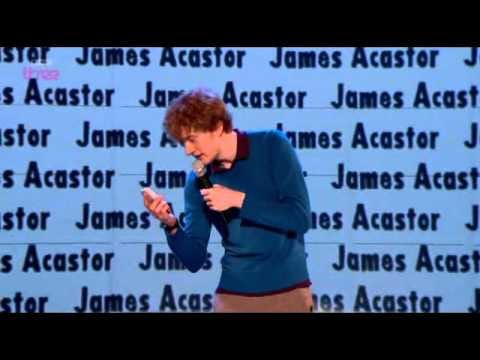
His award winning series of four comedy specials, Repertoire, went live on Netflix this spring. I watched all four hours once or twice daily for a good two weeks. I kept finding more to get out of it. Acaster mixes normal stand up with non-linear storytelling and unreliable narrators. He begins talking about how he is actually an undercover cop named Pat Springleaf undercover as a stand up comedian named James Acaster, and how his wife left him because he got too caught up in the case. In the next episode, he doesn’t mention any of this, instead focusing on his stint in jury duty and his complex relationship with religion, ending with a five minute long shot of him eating an orange by candlelight. The third episode is centered around “a fresh start” and how a honey-based scam gone wrong has forced him into witness protection. The fourth episode, possibly the most heartbreaking, includes the story of how he became an undercover cop through witness protection and how he met his wife through a game of flirty Twister, and how much he loves her and can’t see the relationship going wrong anytime soon.
It sounds complicated, and it is, but Acaster acknowledges it. In the very first hour, he cracks a joke about how he knows an undercover cop pretending to be a stand up comedian is weird, but “not as weird as a stand up comedian pretending to be an undercover cop! Imagine that LOSER!” The entire narrative is built on a system of deflection and projection, ultimately ending with a story of a duck talking to a decoy about how meaningful his life is, how fascinating higher powers are, in fact, he’s written a series of one-man shows about it. That’s what tips the stories from funny to heartbreaking: that moment you realize “hang on, I think he’s actually talking about himself here” peppered between conventional jokes about Dr. Pepper and secret santas.
The nonlinear storytelling breaks the contract every stand up comedian makes with their audience, the sort of intimacy only one person on a stage can muster. You have to trust them to entertain you, you put your sensibility into their hands. It’s a dangerous thing, laughter: it makes you so vulnerable, you take your guard down in order to laugh but its so easy for a performer to take advantage and punch you in the gut instead.
Jokes have two parts: set ups, and punchlines.
Is the ultimate punchline the lack of one altogether?
Hannah Gadsby is another comedian I have heard so much about. Her work on (possibly the greatest tv comedy of our generation) Please Like Me is phenomenal, and helped me overcome my struggle with self-harm. Her miniseries Hannah Gadsby: Arts Clown, a four part art history lecture for the radio made me feel so smart, though I’m unsure how well radio works as a medium for art lectures. Like Repertoire, Nanette made waves at the Edinburgh Fringe, the festival for experimental one person theatre.
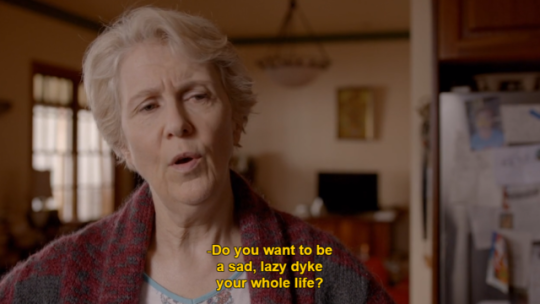
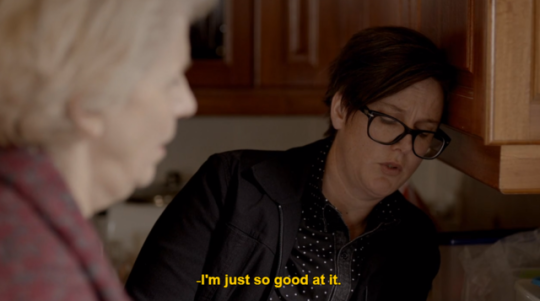
Nanette uses tension the way Repertoire uses nonlinear storytelling. It starts slow, with jokes that make you wonder Wait can I laugh? and builds until Gadsby reaches the crux of her argument: comedy is about tension. But there’s enough tension in the day-to-day existence of a “gender not normal” lesbian that building artificial tension is a futile practice.
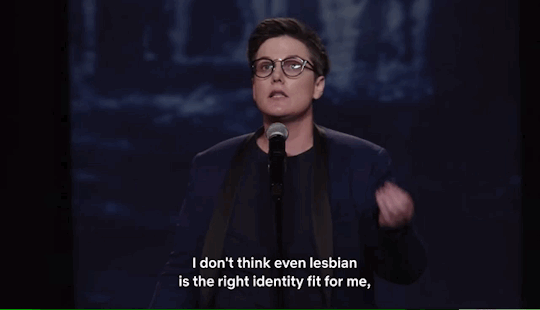
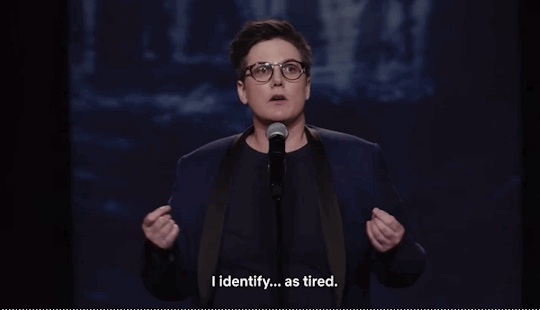
I have to come clean here: I can’t watch Hannah speak on these topics without relating to her personally. She was raised in the extremely homophobic society of late 20th century Tasmania, I was raised in the one-two punch of homophobic societies: the military and the Catholic Church. She’s a lesbian who finds it hard to fit in “with her people.” I’m a genderfluid lesbian-ish person who is dating both a polygender person and a trans man. I don’t know what to call myself. I don’t know where I fit. So when I hear her say:
“I’ve built a career out of self-deprecating humor… and I don’t want to do that anymore. Because do you understand what self deprecation means to someone who already exists within the margins? It’s not humility. It’s humiliation. I put myself down in order to speak. In order to seek permission to speak. And I simply will not do that anymore. Not to myself, and not to anyone who identifies with me.”
Yeah… that hits hard.
Hannah speaks at length about internalized homophobia. There’s no way to effectively explain how it feels to hate the person you are, to hate the person other people think you made yourself into. With Hannah, she sealed off her shame and funneled it into jokes. With me, well, I don’t know. I’m still trying in vain to seal it all in, but in Icarian irony the closer I get to true self acceptance the more that seal melts and leaks and ruins it all again.
But this is a Very Serious Media Criticism Piece.
One of the weirdest similarities between Repertoire and Nanette is the recurring thread of color symbolism. Hannah makes the case for blue to stop being called a masculine color while wearing a blue shirt and blazer, in front of a blue background, while Repertoire exists in a monotone world of olives, mustards, and burgundys through backdrops and various items of corduroy clothing worn by James, making it feel like a living breathing Wes Anderson shot. Until, of course the final episode, Recap, which incorporates all three colors.


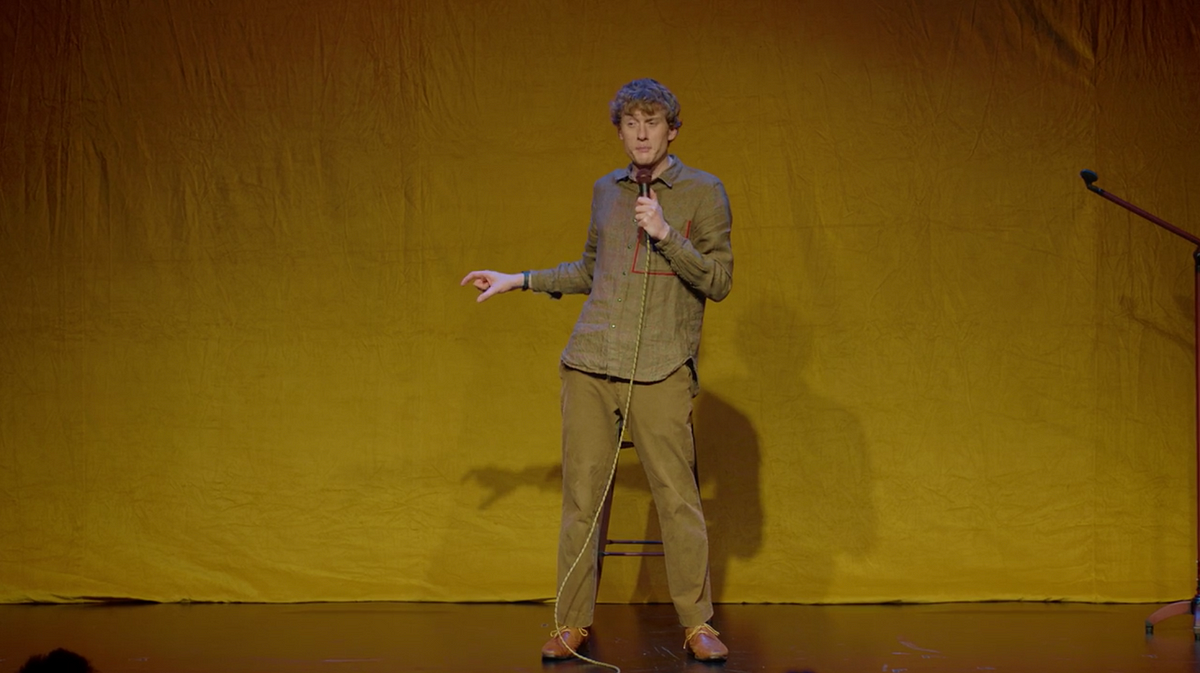

It’s this element that made me stop looking at these works as stand-up comedy and start looking at them through the lens of theatre. I’m 3/4 of the way through a theatre degree, so with my 3/4 of a qualification, I know how to spot when effort is put into the subconscious messages of visuals. There’s more to Repertoire than starting the story at the end and looping around. There’s more to Nanette than deconstructing comedy. Both of these works are about connection. About humanity. When James projects his issues onto an audience member or sings a long winded football chant to one specific man in the front row, he’s sharing his story with people around him. When Hannah corrects her storytelling about a encounter with a violent man, she’s not admitted defeat in comedy. She’s sharing her truth for those in similar circumstances.
That’s a lot of theatre theory to throw onto stand up. Stand up is, by and large, a lowbrow medium. There’s no “Standup History” course at my small women’s college, because if there were I would have taken it already and all my classmates would hate me because of my “enthusiasm.” Laughter is cheap. Art is expensive. Art is honest. Standup is deceptive.
As Gadsby says, in comedy, you can’t end stories where you want to, because you have to end on a laugh. In fact, you don’t have to tell true stories at all. Where Nanette slowly reveals that a story that is told honestly isn’t necessarily the whole picture, Repertoire slowly reveals the nugget of truth in a scenario that is outrageously absurd. Both take the audience by surprise, breaking the contract formed between performer and audience.
Nanette’s preoccupation with identity is reflected mainly through art history, because that’s what Hannah Gadsby got her undergrad degree in. She speaks on the virgin/whore binary, the responsibility of artists to “suffer,” especially in terms of mental illness, and her grudge against Pablo Picasso. Of course, this is not about art. Hannah just uses it because that’s what she knows, just like how I compare plot points in The Bachelorette to David Mamet plays: we’re all slaves to our major.
Every single issue she finds with art is an issue the world finds in her. The pressure on women to become representations of their sexuality, the pressure on mentally ill people to either be normal or make a commodity of their illness, and the toxic masculinity of the entitled man.
When Hannah reveals that her lighthearted story about a man who almost beat her up actually ended with her being beat up, that’s her way of making the audience feel the shame she feels every time she told that joke. They laughed originally, but now, faced with the true reality, they realize that it was her own homophobia that kept her from telling the truth. She refuses to fulfill the job of the comedian to diffuse the tension.
Hannah Gadsby breaks a commandment of comedy: she is angry onstage and she refuses to make herself the butt of the joke or make light of the situation.
She says, to a fully hushed Sydney Opera House, that it would have been more humane to have been killed than to suffer what she suffered in her lifetime.
Her audience is fully disarmed. The intimacy of solo theatre becomes less of a jester show and more of an investigation. And why does she alienate her audience? Because she feels alienated every single day of her life and she’s not sacrificing herself for their humor anymore.
But ultimately, Nanette is for the “normals.” For those who carry that alienation, that shame within us every day, doubling it down is an experience best done once or twice. When I start fantasizing about slicing my breasts off or stabbing myself in my ovary, I don’t want to hear about how I would be better off dead. I reach for the low key whimsy of Repertoire. And that’s okay. It was so important for me to hear Hannah’s story, but it’s not something I want to relive over and over. But what I do want is for everyone in my life to live it. Just for an uncomfortable hour, understand what it feels like to slowly feel the tension marginalized people feel every day.
I don’t know how I’m going to unlearn my self hate. I don’t have the confidence for stand up comedy. I don’t have the skills for media criticism, as I just found out. But I refuse to let others around me put societal pressure on me without empathizing with me. And that’s why I owe my life to Hannah Gadsby. But I also owe it to James Acaster, because until I figure something out, I can always just escape into the ruddy-colored world of Repertoire.
People like me reserve the right to have our pain represented. But we also reserve the right to escape if we need it.
“Sierra Burgess is A Loser” is Watered Down John Waters
It’s a testament to the movies of the eighties, but all the wrong parts.
Every year since I’ve started college, I write a longer and more complex version of the same paper: Comparing the Adapturgical Approaches of Shakespeare’s Twelfth Night on Film. In research for this, I watch a lot of teen movies. Like, a lot. Even the terrible ones. I focused mainly on Just One of the Guys, the 1986 Twelfth Night adaptation that turned the Shakespearean play into a sex comedy. I wrote it off as a product of its time, how it was full of sexist jokes and used breasts as a punchline. It’s just what was considered okay at the time.
That’s what I want to do with Sierra Burgess is a Loser, the Netflix movie based on Cyrano de Bergerac that I’ve been waiting for for a whole year. I want to say “oh, well, transphobic jokes weren’t as big of a deal then.” “Making fun of the disabled was still seen as okay.” But the entire crux of the movie rests on smartphones. This is all too modern of a modern adaptation.
And by “adaptation” I mean “A movie where one of the characters kinda has a similar name and role to a character from literature.” If you are looking for an actual adaptation of Cyrano, I’ll point you to The Adventures of Serena Berg, a queer webseries adaptation with an Asian trans woman lead. I thought this review would be picking apart the adaptation choices, but the title and the overarching concept of the plot are the only relics from Rostand’s work.
The screenwriter of the film defended her use of the first transphobic joke, saying she needed to use it to demonize the villain, and it doesn’t represent her personal views. Excuse my frankness but that doesn’t matter a bit. I don’t care if I’m hearing transphobic bullshit from the concept of evil incarnate, it still hurts. I’m trying to learn screenwriting myself, and already I know there are far more appropriate (and less lazy) ways to communicate villainy.
One of the main scenes that made me think of old 80s movies was the scene where Sierra and her friend Dan run into love interest Jamey and his little brother. Sierra refuses to speak, because Jamey would recognize her voice, so Dan introduces her as “my deaf sister” and Sierra clumsily signs something. Jamey, who knows ASL, inquires why her name is “Shit Pizza” in ASL before introducing her to his brother, who is actually deaf. That whole thing is a mess top to bottom, not to mention Dan taking advantage of Sierra’s temporary muteness by loudly proclaiming her a “hermaphrodite.”
It’s obvious that the movie is inspired by 80s movies. I mean, heck, Sierra’s parents are played by Alan Ruck and Lea Thompson. The movie ends in a character by character freeze frame epilogue. But this isn’t the eighties. No character, no matter how relatable, can hide under a car and kiss her crush without consent in this day and age without some pushback. Regardless of how many cute animal pics they send to each other (which, by the way, is not how teenagers nowadays flirt, but showing them sending actual memes would date the movie down to a specific month, such is the life cycle of the meme.)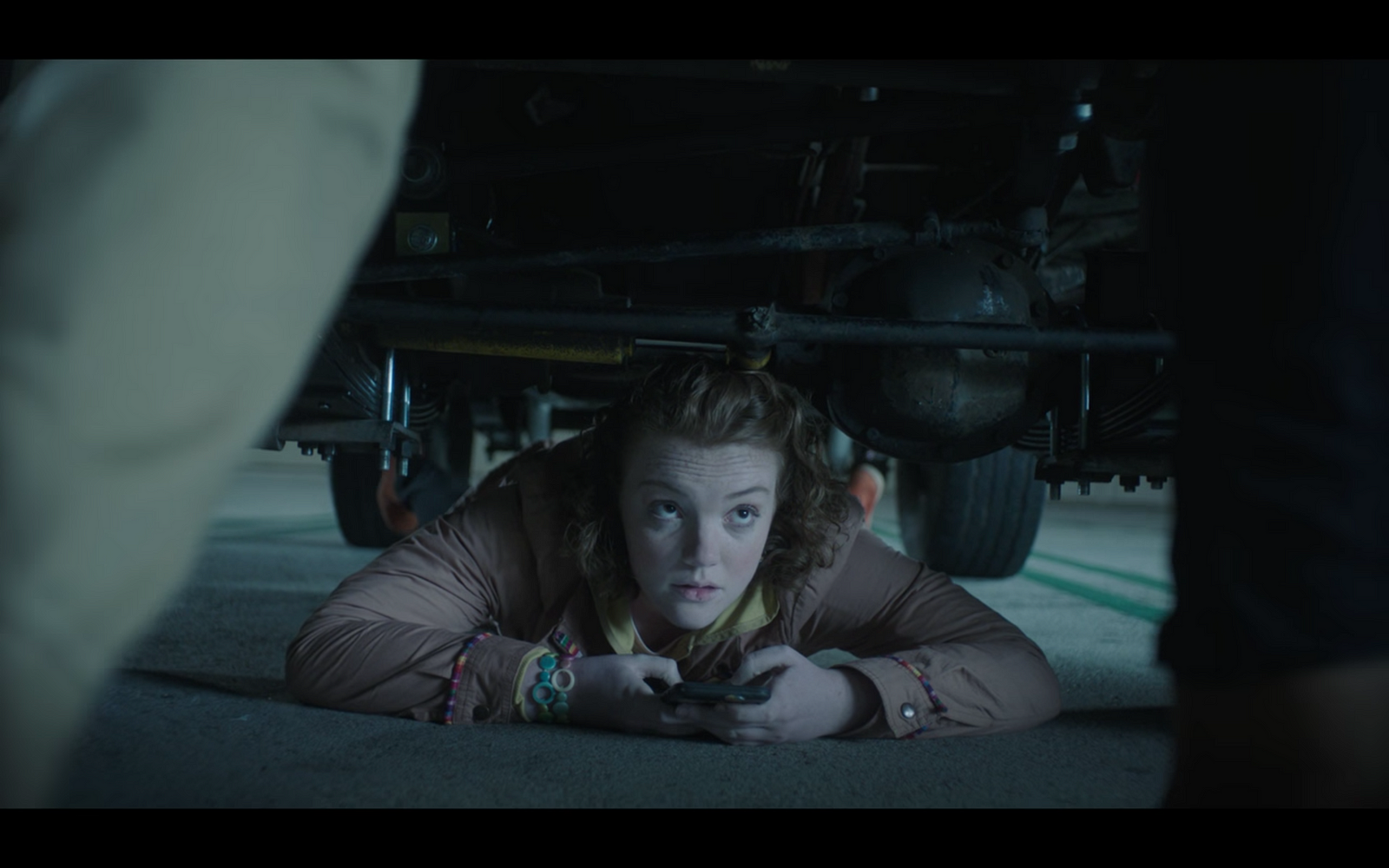
The movie was supposed to be a triumph for girls who are plus sized. But I’m afraid it could be interpreted as a triumph for people who believe romantic love is deserved to them because of a disadvantage. She lies, deceives, hacks into someone’s private social media account, does whatever she can to keep her crush thinking she’s thin. That’s not self love, that’s shame, shame that is magically fixed by her writing a song about how she’s not a rose, she’s a sunflower (which, by the way, is a poem I literally wrote in 11th grade.) This Ditty Ex Machina is another lazy scriptwriting trick to make everyone forgive her, even if she betrayed their trust over and over again.
It’s not a totally awful movie. Noah Centineo’s character, Jamey, is one of the better written love interests of the genre. He’s insecure, loves his brother, and has all the “football player with a heart of gold” personality traits CMM had in A Cinderella Story. He’s the perfect antidote to toxic masculinity I would want boys to have. The casting is excellent, and the actors did the best with the script they were given, save some terrible fake flute playing. Sure, it’s predictable, but predictable is the point.
So the question remains: how do we pay tribute to the older movies we love while keeping the smart writing we expect today? It’s easy. Take an element you enjoy. Is it problematic? Then don’t use it. Is it not? Go for it. It’s not that difficult, in fact, it’s realistic to make a character mean and still woke, just look at leftist Twitter.
Even Regina George reminded Karen she couldn’t just ask people why they’re white. And she’s famously a Mean Girl.
The Bachelor: The Movie
My favorite class I ever took here at Agnes was Dramatic Writing II, Intro to Screenwriting. It was incredibly labor intensive and the grading was merciless, but if I could take that class every semester I would.
We were supposed to come in with three movie ideas, and I spent hours laboring over three pitches: A teen adaptation of The Marriage of Figaro, a teen adaptation of The Taming of the Shrew where Petruchio was a trans lesbian, and a romantic comedy wherein a lesbian blackmails her way onto The Bachelor. We submitted the ideas anonymously, but I may as well have written my name all over them. They were very on brand.
The Bachelor idea was far and away the most popular, so I set about working on it. I interviewed past contestants, I cast it in my head, and begun scripting the first half. The work was slow, my professor would hold a ruler up to my script and hand it back if the text was 10.5 cpi (characters per inch).
I wrote 10 pages of script a week. I began to love my characters, Tasha, the headstrong lesbian, Jackie, her love interest who everyone seems to fall for, Gary, the fame-hungry bachelor, even Spatula, Tasha’s cat. They grew with me over the course of the year. As I matured, my characters matured.
Now I’m working on the screenplay as my senior seminar, and I keep falling in love with my work over and over.
From Screen to Stage and Back to Screen
Between my dual passions of theatre and film, I’ve always been torn between being on stage and being behind the camera. I was either acting or directing in plays or writing, acting in, and producing my own webseries. It wasn’t until Fall of 2017 that I was able to combine my two passions.
In Fall of 2016, Shipwrecked Comedy released Edgar Allan Poe’s Invite Only Murder Mystery Casual Dinner Party for Friends Potluck, known affectionately as Poe Party. It was a lavishly filmed webseries, paying homage to movies like Clue, while also nodding to classic literature. It was based on Edgar Allan Poe and his ghost manservant Lenore hosting a murder mystery dinner party for his author friends, only to have them get killed off for real.
Characters involved included Ernest Hemingway, Oscar Wilde, H.G. Wells, Charlotte Bronte, Emily Dickinson, Louisa May Alcott, George Eliot, and other authors. George Eliot was my favorite. Author of Middlemarch and born Mary Ann Evans, George Eliot was portrayed as a woman trying (and failing) to pass as a man. She was played by Lauren Lopez, known for portraying Draco Malfoy in A Very Potter Musical. She was a delight in a too-big Indiana Jones hat and fake mustache. I was so sad when she was killed off.
The show ended around Halloween 2016, and lo and behold, by Halloween 2017, I was playing George Eliot on Agnes Scott’s stage. As soon as the school year started, I was approached by two students who had received permission from Shipwrecked to adapt Poe Party for stage. They asked me to adapt the script, as I had previous scripting experience from my webseries. I spent weeks slowly slicing away at the script until it was a tidy 1 hour. I immediately texted my best friend, the biggest poe party fan I knew, that she had to play Poe. Auditions were held, and we just baaarely had enough people to make it work. We had a cast. And me? I got to play George Eliot.
Rehearsals were so much fun. Everyone cared so deeply for the work we did, it was a student-led, student-directed performance. Costumes were scrounged up, I invested in a real hair fake mustache, everything felt perfect. But resources were limited. We could only perform this once, on Halloween night, and then never again. We were so proud of our work, we wanted it to live on. So I decided to film it. Over the course of many rehearsals, I slowly built close ups of as many scenes as I could. Then, on the actual performance, I set up a camera in the back of the theatre. The footage from that camera was electric. When our passionate cast got in front of a smart, enthusiastic Agnes audience, everything was funnier. The laugh as I died and finally dramatically “revealed” my true identity will always stay with me.
Cutting together that footage made me realize how similar my two passions were. Sure, it can be difficult to bridge the gap between the mediums theoretically, but in practice, it’s just a matter of staging. I can write a script and it would do just as well on stage as on film. I could study theatre and find a career in film, I could study film and find a career in theatre. It’s all storytelling, it’s all one.
Getting Serious About Comedy
Freelance writing is HARD. I still, technically, haven’t become a freelance author, I haven’t yet gotten paid for my work. It’s that cutthroat of a business. Almost all of my peers on Twitter are freelancers and get bylines all the time. I struggle to publish one or two pieces a year, but I have much more prolific success on my own personal Medium page.
By self-publishing, I can talk about whatever I want, which, 90% of the time, is television. I recap The Bachelor, I discuss Frasier, whatever. In June of 2018 Netflix released Nanette, a sort of anti-comedy comedy special by Hannah Gadsby. I had heard about Nanette from its run at the Edinburgh Fringe festival but when it was released on Netflix it took the Internet by storm. Everyone had a hot take about it, including me. But my hot take included references to a whole other work.
James Acaster’s Repertoire, a series of four connected stand up specials, was released on Netflix in April. I watched it maybe four or five times a day, discovering something new each time. It was low key, it was whimsical, it was silly, everything that Nanette was not. But I still found myself comparing the two.
At three AM one June night I started writing my thoughts of the works, about how Nanette is made for the cisgender and heterosexual, how it reinforces the hate I face every day, and how Repertoire is my escape into something else. I didn’t edit it at all, much to my own detriment. I had to retroactively correct many typos in the following weeks.
I published the piece at 8 am the next morning. My peers in publishing read it and started recommending it in threads debating the worth of Nanette. It easily became my most read piece on my Medium page.
In the early hours of the fourth of July, I weirdly woke up, not my usual routine at all. Groggily, I checked my phone. James Acaster just followed me on Twitter. The creator of Repertoire himself. I quickly gathered my thoughts, trying to figure out what to do next. Because he followed me, I was allowed to send him Direct Messages. I carefully composed a message with a link to my piece and how much Repertoire meant to me. Before my eyes, I watched him text a response.
He read my work. He loved it. He saw Nanette and it made his work seem frivolous, but my piece reminded him why he does comedy and why it’s worth it.
My work did that. My work encouraged someone who encouraged me. Skills that I learned and honed here at Agnes put me in touch with someone who saved my life. In the future, all I want to do is chase that feeling of worth I got when James responded to me. It means everything to me.
Final Reflection
During this class I learned many lessons, but probably the key lesson I learned was on the concept of the traveler. My favorite reading in this class was the Baudelaire reading, I loved this concept of this fly-on-the-wall idea of the dandy. Throughout my travels in Europe over my life, my family would try our hardest to avoid portraying ourselves as “ugly americans”, which is quite futile when you’re a large family of six. The idea of a “man of the crowd” was interesting to me, as this was the first time I would be travelling without my family and could actually avoid looking glaringly like a tourist, at least a portion of the time.
In this project specifically, I learned about the relationship between clothes and the senses, and about my own connections to New York and the concept of the senses. I thought the senses theme would result in a dress covered in ears or a sandwich board that looked like a sandwich. As I thought more about the unique environment that is New York, I found conceptual and avant-garde meanings to the senses that I could interpret in clothes. Going fabric shopping taught me more about fabrics, which I had a passing knowledge of but actually shopping and comparing weights and prices gave me well needed experience.
Reflection Logs pt 2
Week 5: In Life and Debt we heard this quotation near the end of the film. How do you respond to the following words now that you have seen both films based on events separated by a century?
“Once you cease to be a master, once you throw off your master’s yoke, you are no longer human rubbish, you are a human being, and all the things that adds up to. So, too, with the slaves. Once they are no longer slaves, once they are free, they are no longer noble and exalted; they are just human beings.” (Jamaica Kincaid, A Small Place)
Life and Debt greatly impacted me because I went on a vacation to Jamaica when I was seven. It was on a private resort, all inclusive, everything the film warned against as bad for the community. I was the typical tourist. I stayed on the resort grounds, got (ill-advised) cornrows that made my scalp burn in stripes, and was generally ignorant of what was happening outside the shiny floors and white beaches. The only time I truly saw the “real” Jamaican population was on the flight to and from Montego. The only flight available from Cuba was a military cargo flight in which earplugs were required and Motion Sickness Kits were handed out by the dozen. There, we saw a whole plane full of migrant workers with bags of american toys and snacks traveling home to see their families. The government paid for them to go home once a year, and you can tell by the look on their faces how much they had looked forward to this.
These people escaped the economic devastation of Jamaica, but their families and loved ones didn’t. Because as happy as the people looked, there was a glimmer of something worse, the knowledge of the situation they are in.
Week 6: Our panelists each offered advice for the trips. Whose advice do you think it most relevant to your experience in New York? What was the advice? Why is it relevant?
Though it was repeated ad nauseum, the phrase “okay, good” stuck with me. I am an extremely anxious traveler who does not like situations I have not planned for, and with this trip there’s a large possibility something unexpected will happen. Even if I don’t deal it like an absolute champ, forcing myself to see the bright side will, at the very least, distract my brain from completely panicking.
Week 7: Complete your learning contract and email it to Katherine at your earliest opportunity! Write a reflection log entry about the process of creating the contract.
I am in love with my Learning Contract, it’s great. I get to write poems and design costumes and get credit for it. I love the fact that I can tailor this class to focus on the academic areas that I want to excel in instead of writing papers on assigned topics. Also, this way I can learn from other people’s choices of Contract choices. I really feel like an artist now that I’ve solidified my contract.
Week 8: Considering the common discussion on Tuesday and the in-class discussion today, write about one thing that you confirmed about what your learned from being in New York AND one experience/perspectives shared by one of your peers (in another class or in ours) that is different than your learning experience. Be sure to articulate the “so what” of your ideas – why is the first (yours) significant for you and why the second (from your peer) is noteworthy to you.
I kept using the term “independent” in my conversations about this trip. I hate to say it but I now feel more comfortable using the public transit in New York than in Atlanta. I trust myself to be able to source what I need and problem solve if there is an issue, instead of giving up and panicking, something I’m afraid I do often. Someone else in my group used the word “empowering” and I feel that too. I feel like everyone who traveled came back as more of themselves. Themselves but with the volume turned up. I left agnes a theater major and I came back an aspiring designer with an interest in art history. If that doesn’t speak volumes about the values of summit I don’t know what will.
Mapping Project
This image is composed of a elizabethan style gown on a black foam mannequin. The dress is scoop necked, with elbow length sleeves, embroidered with two large gold peacocks with tall tail feathers, the left one’s extending all the way up to the neckline. The fabric looks like a gold satin with lace cuffs and embellished trim. This costume was worn by Dorothy Kirsten in the title role of Madame Lescaut. It is a part of the Metropolitan Opera’s archives, on display in the landing of the first mezzanine. I chose to take this image because I am incredibly interested in fashion design and theater costuming, and I could use this image as inspiration for a look. I grew so much as a person on this trip, and began actually designing ready-to-wear and couture hours after taking this picture. This image represents how when you travel to learn about others’ lives, you learn more about yourself. This trip cemented my decision to follow my path of fashion design. This image shows my learning as a student because I stopped taking pictures of art for its own sake, and began thinking about how it could inspire me to create. -Daisy Johnston
New York Performance Reflections
I grew more than I ever thought I could in completing my Global Contract objectives. I loved every poem I wrote, every outfit I drew, and I ended up switching my goals quite a bit. Instead of using descriptive writing to express my feelings towards paintings, I used a different medium to express myself: fashion design. Flipping through my journal, I can see my growth in those handful of designs based on artwork. My first design, the Lady with the Rose, is just a slightly updated version of the one in the work. My latest piece, the Piet Mondrian piece, is a vastly updated piece that takes into account the movements in fashion I learned from a book I bought in New York.
Creating looks based on art pieces and whole museums inspires me the way listening to poetry inspires me to write poetry. I had never really experienced that sort of fluidity from what I see to what I had in my mind to what I put on paper.
My definition of a global citizen has definitely changed. As someone who was lucky enough to live abroad, I had always subconsciously looked down upon people who never were able to live internationally. I now realize, especially after dinner at the tenement museum, that global influence can truly affect you without leaving your country. I had an authentic Cuban sandwich and authentic German Spatzle in the Lower East Side. These things instantly reminded me of my international homes, and just prove that you can be plenty cultured and become a global citizen without leaving your own country.
